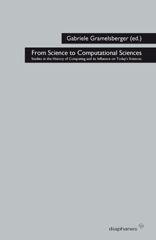FU Institute of Philosophy
Home
Research
Publications
Workshops
Teaching
Talks
Contact/Editorial

2007, September 20-22, Berlin-Brandenburg Academy of Science and Humanities
The colloquium posed research questions on the societal and cultural influence of computation as well as on the role of applied mathematics for today´s "Lebenswelt". With the introduction of new technologies, embedded systems and rational prognosis, mathematical concepts are being increasingly implemented in our everyday life and expand our way of living. The Blankensee-Colloquium 2007 tried to identify and discuss relevant areas of research towards a Philosophy of Computational Sciences.
»Reader (Abstracts) (pdf, english, 250 kb)
Blankensee-Colloquium Programme
Thursday, 2007, 20th of September, 5:00 to 8:00 pm
Opening, 5:00 - 5:30 pm
Brief Introduction to the Blankensee-Colloquium 2007
Prof. Dr. Kurt Kutzler, President of the Technische Hochschule Berlin, »opening (pdf, german, 20 kb)
Prof. Dr. Sybille Krämer, Institute of Philosophy, FU Berlin / Permanent Fellow, Wissenschaftskolleg - Institute for Advanced Study, Berlin
Key Note Lecture, 5:30 - 7:00 pm
Digital Labscapes: How Simulation Produces Knowledge
Prof. Dr. Martina Merz, Institute of Sociology, University of Lucerne
Evening Lecture, 7:00 - 8:00 pm
When Computers Were Human
Prof. Dr. David Alan Grier, Center for International Science and Technology Policy, George Washington University
Friday, 2007, 21st of September, 10:00 am to 7:00 pm
Philosophical Remarks on the Rationality of Quantification
- "Roots and media of computational power. Some remarks on the genesis and genius of quanti-fication in early European Modernity", Prof. Dr. Sybille Krämer, Institute of Philosophy, FU Berlin / Permanent Fellow, Wissenschaftskolleg - Institute for Advanced Study, Berlin
- "Terminus Medius - On the Ambivalence of Simulation", Dr. Nils Röller, HGZ School of Art and Design, Zurich
- "Steps and Missteps in the Process of Quantifying Nature", Prof. Dr. David Alan Grier, Center for International Science and Technology Policy, George Washington University
The Infrastructure of a Culture of Calculation
- "The Impact of Petacomputing on Theories and Models", Prof. Dr. Dr. Thomas Lippert, Director of the Center of Ap-plied Mathematics at the German Research Centre Juelich / Member of the Board of Directors of NIC John von Neumann Institute for Computing
- "Supercomputing: A new era of opportunity and challenges", Dr. Alan Gara, IBM Chief Architect Blue Gene, J. Watson Research Center, Yorktown NY, USA
- Canceled: "Predicting versus Shaping Reality by Mathematical Simulation and Optimization", Prof. Dr. Ulrich Trottenberg, Director of the Fraunhofer Institute for Algorithms and Scientific Computing, St. Augustin
Shaping Reality with Algorithms: Earth System, Cells and the Human Brain
- "Shaping Reality with Algorithms: The Climate System", Dr. Johann Feichter, Head of the Research Group "Aerosols, Clouds and Climate" at the Max Planck Institute for Meteorology, Hamburg
- "The Blue Brain Report", Prof. Dr. Henry Markram, Project Director of the Blue Brain Project / Director of the Center for Neuroscience & Technology, EPFL Lausanne
- "Simulations of the Circadian Clock", Prof. Dr. Hanspeter Herzel, Institute for Theoretical Biology, Humboldt University
Saturday, 2007, 22nd of September, 10:00 am to 6:30 pm
The Artificial Nature of a Technoscientific World
- "Syntheses of artifacts to simulate the natural", Prof. Dr. Sergio Sismondo, Department of Philosophy, Queen's University, Kingston
- "Predicting and Explaining with Simulations: Perspectives from Public Health Research and Policy-Making", Dr. Erika Mattila, Economic History Department, London School of Economics and Political Sciences
- "Artificial, False, and Performing Well", Dr. Johannes Lenhard, Center for Interdisciplinary Research, University of Bielefeld
Loops between Methods: Simulation, Experimentation, and Measurement
- "Mountains in the Lab: Models, Experiments, and the Problem of Scale", Dr. Thomas Brandstetter, Institute of Philosophy, University of Vienna
- "Loops between Simulation and Experimentation", Dr. Gabriele Gramelsberger, Institute of Philosophy, FU Berlin
- "Constructivist Computing for Empirical Modelling", Prof. Dr. Steve Russ, Department of Computer Science, Warwick University (statement)
Rational Prognosis, the Management of Uncertainty and Future II
- "Research technology, the computer and scientific advance" Prof. Dr. Renate Mayntz, Max-Planck-Institute forthe Study of Society, Köln (statement)
- "Particle Histories. Herman Kahn and the 'Conceiving of the Unthinkable'", Prof. Dr. Claus Pias, Institute of Philosophy, University of Vienna
- "Uncertainty in Grammar. Predictions and the Future in the Past", Dr. Peter Bexte, Institute for Media Sciences, University for Applied Sciences of Potsdam
- "Preemptive Culture: its computational significance, historical origins and strategic epistemology", Carlé, Martin, Institute for Media Science, Humboldt University Berlin (statement)
Discussion: The Societal and Cultural Influence of Calculation: The Mathematisised View of Science - Towards a Philosophy of Computational Sciences
Moderation: Prof. Dr. Ulrich Wengenroth, Director of the Munich Center for the History of Science and Technology, c/o Deutsches Museum/ TU Munich
Information
Location: Einstein Hall, Berlin-Brandenburg Academy of Science and Humanities, Jaegerstrasse 22/23, 10117 Berlin
Organised by: Gabriele Gramelsberger, FU Berlin
Funded by: Kooperationsfonds Berlin, coordinated by the Institute for Advanced Study Berlin
The Blankensee-Colloquia are awarded by the Presidents and Chancellors of the Free University Berlin, the Humboldt University Berlin, the Technical University of Berlin, the Berlin-Brandenburg Academy of Science and Humanities, the Social Science Research Centre Berlin and the Institute for Advanced Study Berlin.
